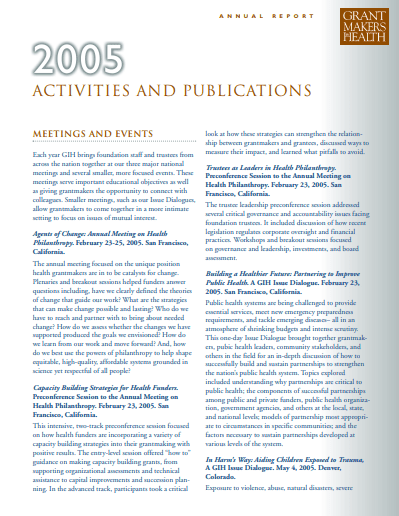Counting in Connecticut: Arming Advocates to Protect Health
A foundation provides a Medicaid coalition with the hard numbers that help sway a statehouse.
Behind the Smile: How Funders Can Improve Oral Health
The consequences of neglecting oral health are significant. Oral disease can interfere with the ability to speak, chew, and swallow. In some cases, painful mouth conditions can result in overuse of emergency rooms and lost productivity, and contribute to low self-esteem. Oral disease, in children alone, is responsible for almost 52 million lost school hours each year.
Annual Report 2005
The Annual Report looks back on 2005, highlighting key facts about the organization’s operations and governance.
What to Expect When You’re Expecting to Improve Community Health
Building grassroots capacity for change can be a messy, hard-to-measure business.
On the Front Lines of Public Health
Foundations are well positioned to collaborate with federal, state, and local health departments to create change within the public health system. They can also support and guide partnerships that embrace a variety of community stakeholders and draw on the strengths of each. This Issue Focus looks at strategies and examples for establishing such partnerships.
From the Ground Up: Plenary Addresses From GIH’s 2006 Annual Meeting
This report features plenary speeches delivered at Grantmakers In Health’s 2006 Annual Meeting on Health Philanthropy, From the Ground Up: Improving Community Health, Inspiring Community Action. The meeting explored how grantmakers are meeting the challenges of creating healthy, vibrant communities. These remarks inspired attendees and served as a catalyst for engaging and informative dialogue throughout the meeting.
Supporting Local Efforts to Improve Health Care Access
The number of Americans without access to health care has continued to climb due to rising medical costs,ongoing declines in employer-sponsored coverage,and recent cuts in public programs. With no national solution in sight, many cities and counties across the country have designed local initiatives to provide coverage and care for their uninsured residents. This Issue Focus looks at approaches grantmakers are taking to address these issues.
Implementing the Medicare Prescription Drug Benefit
On January 1, 2006, Medicare prescription drug coverage became available to the program’s 43 million beneficiaries. To receive the coverage, however, beneficiaries must actively opt in to Medicare Part D by selecting a prescription drug plan (PDP).
From the Ground Up
The resource portfolio is from GIH’s 2006 annual meeting, From the Ground Up: Improving Community Health, Inspiring Community Action.

